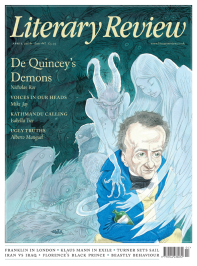Andrew Lycett
The Great Globe Itself
Shakespeare in Swahililand: Adventures with the Ever-Living Poet
By Edward Wilson-Lee
William Collins 288pp £20
Visiting Luxor in Egypt, Edward Wilson-Lee was surprised to be hailed by a local man whose opening gambit was the first line of a soliloquy from Macbeth: ‘Tomorrow, and tomorrow, and tomorrow’. Wilson-Lee responded with the next line from the play and the two strangers traded iambic pentameters from Shakespeare until they tailed off. Then, since the Egyptian had no further conversational English, the encounter ended and Wilson-Lee moved on.
The English language has certainly reached far-off, even surprising places, and Shakespeare has often been its standard-bearer. Having been brought up in East Africa, Wilson-Lee, a Cambridge academic, was emboldened by his Luxor experience to look into the history of Shakespeare’s reception in that part of the world. He knew that one of the first books printed in Swahili was Charles and Mary Lamb’s Tales from Shakespeare, which was published by the Universities’ Mission to Central Africa (UMCA) in the late 19th century as Hadithi za Kiingereza (‘English Tales’) on the island of Zanzibar in a translation probably by the local bishop, Edward Steere. And he wanted to know more.
Wilson-Lee has developed this idea into a fascinating book – part travelogue, part cultural history – that throws a colourful sidelight on this year’s 400th anniversary of Shakespeare’s death. Even while the Bard was alive, Hamlet was performed on board the English ship Dragon when it was anchored off Sierra

Sign Up to our newsletter
Receive free articles, highlights from the archive, news, details of prizes, and much more.@Lit_Review
Follow Literary Review on Twitter
Twitter Feed
It wasn’t until 1825 that Pepys’s diary became available for the first time. How it was eventually decrypted and published is a story of subterfuge and duplicity.
Kate Loveman tells the tale.
Kate Loveman - Publishing Pepys
Kate Loveman: Publishing Pepys
literaryreview.co.uk
Arthur Christopher Benson was a pillar of the Edwardian establishment. He was supremely well connected. As his newly published diaries reveal, he was also riotously indiscreet.
Piers Brendon compares Benson’s journals to others from the 20th century.
Piers Brendon - Land of Dopes & Tories
Piers Brendon: Land of Dopes & Tories - The Benson Diaries: Selections from the Diary of Arthur Christopher Benson by Eamon Duffy & Ronald Hyam (edd)
literaryreview.co.uk
Of the siblings Gwen and Augustus John, it is Augustus who has commanded most attention from collectors and connoisseurs.
Was he really the finer artist, asks Tanya Harrod, or is it time Gwen emerged from her brother’s shadow?
Tanya Harrod - Cut from the Same Canvas
Tanya Harrod: Cut from the Same Canvas - Artists, Siblings, Visionaries: The Lives and Loves of Gwen and Augustus John by Judith Mackrell
literaryreview.co.uk